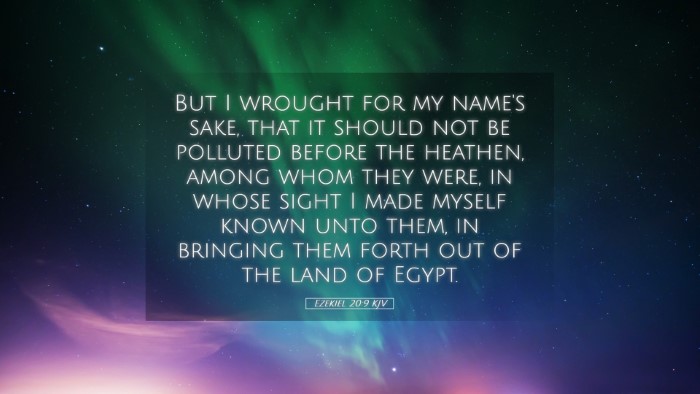Bible Commentary on Ezekiel 20:9
Verse Reference: Ezekiel 20:9 - "But I wrought for my name's sake, that it should not be polluted before the heathen, among whom they were; in whose sight I made myself known unto them, in bringing them forth out of the land of Egypt." (KJV)
Introduction
This verse is a significant part of Ezekiel's prophecy where God communicates His intentions and motivations for the deliverance of Israel from Egypt. Through the lens of various public domain commentaries, we can find profound theological insights that emphasize God's holiness, the preservation of His name, and His relationship with His people.
Summary of Commentaries
Matthew Henry's Commentary
Matthew Henry highlights that God's actions are intensely intertwined with the reputation of His name. He emphasizes that God delivered Israel not because of their righteousness but for the sake of His name. Henry notes that the mention of “pollution” refers to the degradation of God's holiness which could occur among the nations if He allowed His people to remain in captivity. By delivering Israel, God made His glory evident and demonstrated His power among the nations.
- Preservation of God's Name: The verse underscores that God acts in a manner that safeguards His holiness and reputation. Even in their unfaithfulness, God is committed to His covenant.
- Heathen Nations: God’s purpose is not only for Israel but for the surrounding nations to witness His might and faithfulness, which is a call to recognize His sovereignty.
- Act of Deliverance: The delivery from Egypt is portrayed as not just a historical event but a pivotal moment where God revealed Himself to both Israel and the nations.
Albert Barnes' Notes
Albert Barnes expands on the implications of God’s action for His name’s sake. He argues that it is a fundamental principle in understanding God’s nature that His name carries with it His authority, power, and presence in the world. Barnes points out that God’s desire to manifest His great name compelled Him to deliver His people from oppression, illustrating His mercy and justice.
- Theological Implications: Barnes notes that God’s reputation is perpetually at stake, revealing that even in judgment, God’s mercy will always be evident as He seeks to glorify His name.
- Divine Purpose: The emphasis on God’s name suggests that His purposes transcend human failures, and He remains sovereign regardless of Israel's unfaithfulness.
- God's Self-Revelation: The deliverance from Egypt is a revelatory act; it serves to disclose God’s character to both His chosen people and the surrounding nations.
Adam Clarke's Commentary
Adam Clarke provides an analytical view of the verse by studying the historical context of the Israelites in Egypt. Clarke suggests that the narrative of Israel’s redemption from Egypt is not merely about liberation but about identity formation grounded in the recognition of who God is. He argues that the mention of the heathen serves as a reminder that God’s actions are always intended to bring honor to His name before the world.
- Identity of God’s People: Clarke draws attention to how Israel’s identity is linked to God’s name, thereby stressing the importance of holiness and righteousness among His followers.
- God’s Reputation: Clarke echoes the sentiment that God’s name must not be brought into contempt through the actions of His people, highlighting His role as a God of justice.
- Historical and Moral Teaching: Clarke emphasizes that this deliverance serves as a lesson in moral and spiritual behavior for Israel, making it clear that their conduct directly affects God’s glory.
Theological Reflections
From these commentaries, several theological reflections emerge, which resonate profoundly with pastors, students, and scholars alike:
- The Nature of God: The motivations for God’s actions are fundamentally rooted in His nature. His desire to preserve the integrity of His name serves as a pivotal theme throughout Scripture.
- The Covenant Relationship: God’s actions demonstrate the depth of His covenant relationship with Israel. It emphasizes that redemption is not simply for humanity’s benefit but serves a greater divine purpose.
- Witness to the Nations: The call for Israel to be a light to the nations is echoed throughout scripture, highlighting the universal scope of God's redemptive plan.
Practical Applications
For contemporary application, this verse and its commentaries invite serious reflection on the following:
- - How do our lives reflect or distort the name of God in our communities?
- - In what ways can the church become a faithful witness to God's glory in the world today?
- - Recognizing that God is committed to His name, how does this shape our understanding of accountability and grace?
Conclusion
The examination of Ezekiel 20:9 through the insights of Matthew Henry, Albert Barnes, and Adam Clarke provides a rich tapestry of understanding surrounding the nature of God’s actions and the significance of His name. It challenges believers to consider how they bear God’s name in the world, reminding them that their conduct is intrinsically linked to the honor and glory of God.


